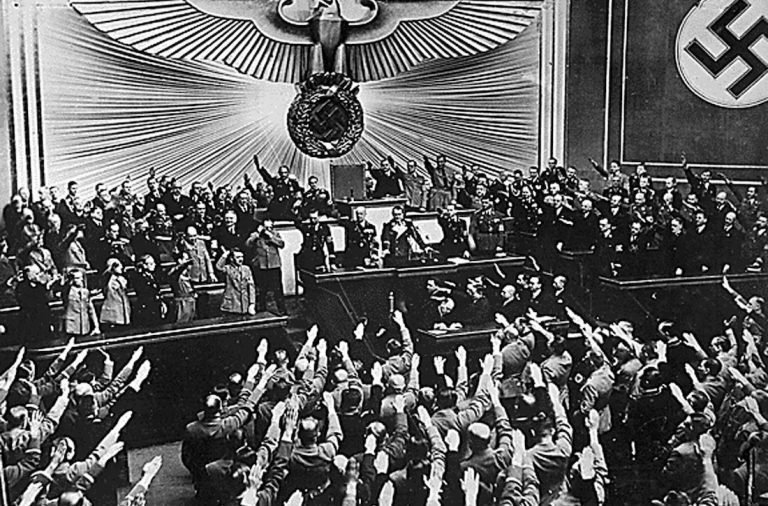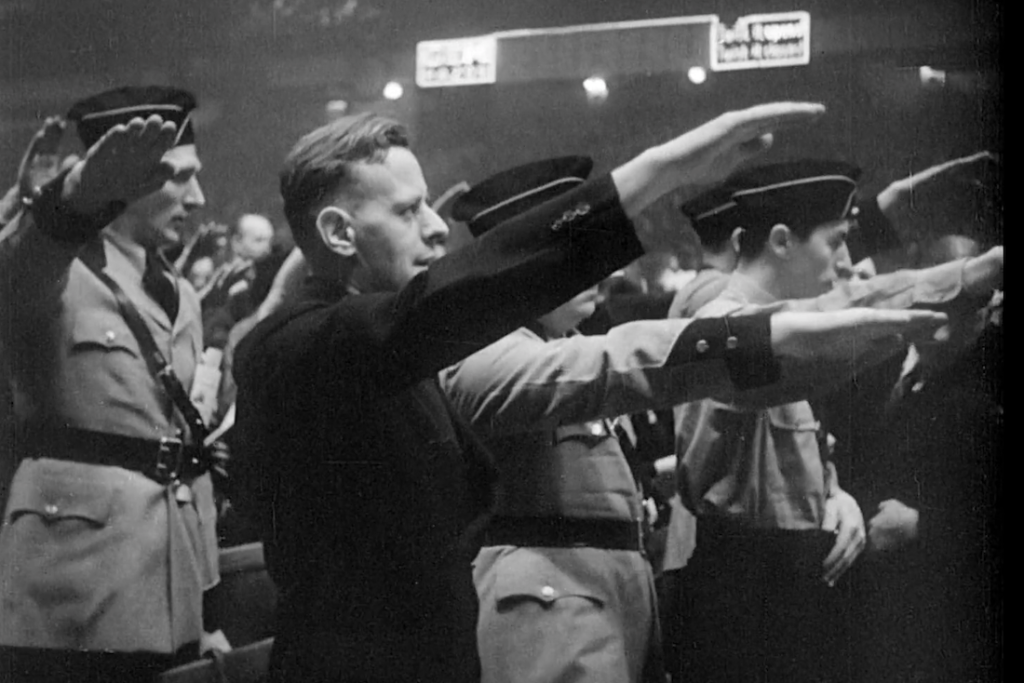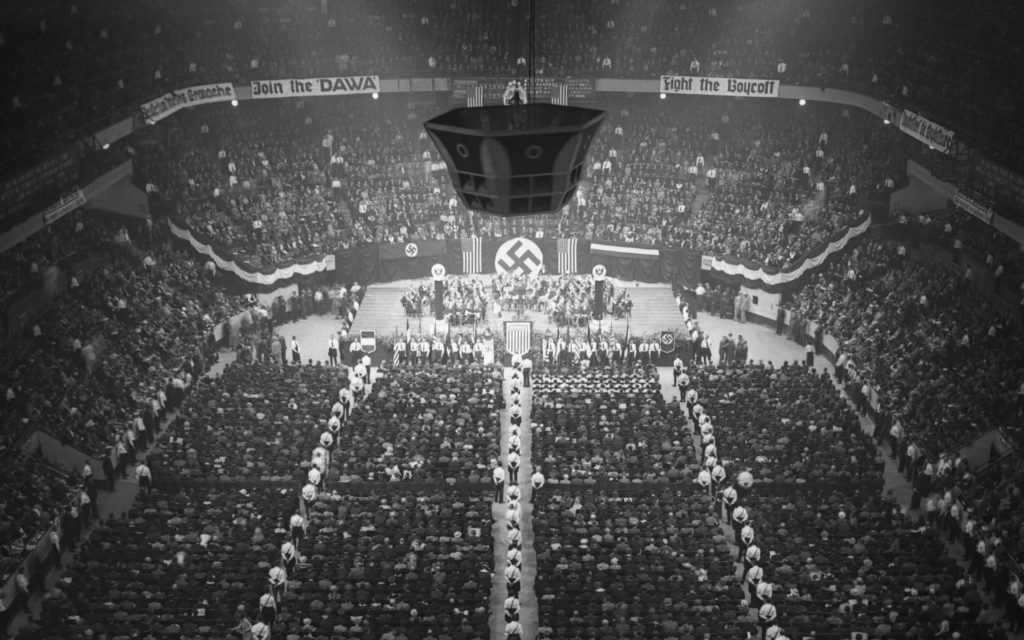
When we compare the MAGA Republican conventions of today with the Nazi conventions of the 1930s, the resemblances are impossible to ignore. Through careful analysis, we see patterns of propaganda, cult-like fervor, and a dangerous narrative of nationalism that bears a chilling resemblance to the past.
New York, N.Y. As students of history and keen observers of current political climates, we recognize the weight of drawing parallels between different eras.
Yet, when we compare the MAGA Republican conventions of today with the Nazi conventions of the 1930s, the resemblances are impossible to ignore. Through careful analysis, we see patterns of propaganda, cult-like fervor, and a dangerous narrative of nationalism that bears a chilling resemblance to the past.
Having survived an assassination attempt, his evangelical supporters are more convinced he is “blessed by God,” reinforcing the messianic undertones of his populist presidential campaign. Trump and his campaign have infused his candidacy with Christian imagery, fostering a cult of personality with him as its leader, solely capable of saving an America he falsely portrays as crime-ridden and on the verge of collapse.
At the heart of these conventions is a potent form of propaganda designed to stir emotions, manipulate perceptions, and rally unwavering support. Just as the Nazi conventions utilized grandiose rallies, powerful imagery, and fervent speeches to create a sense of unity and purpose, MAGA conventions employ similar tactics. The stagecraft, from the selection of music to the orchestrated chants, is meticulously designed to evoke a strong emotional response, galvanizing the base in a manner reminiscent of the Nazi approach.

We observe that the cult of personality is another disturbing similarity. Adolf Hitler was portrayed as the savior of Germany, a figure above reproach whose vision would restore the nation’s former glory.
Likewise, the MAGA movement centers around the figure of Donald Trump, who is depicted as a near-messianic leader capable of single-handedly “Making America Great Again.” The fervent loyalty and uncritical adulation from supporters mirror the blind allegiance seen in Nazi Germany, where dissent was not tolerated and loyalty was absolute.
Nationalism is a central theme in both movements.
The Nazi conventions were rife with rhetoric about Aryan supremacy, the need to reclaim lost territory, and the vilification of perceived enemies. Today, MAGA conventions echo these sentiments through slogans and speeches that emphasize American exceptionalism, border security, and a fear of the “other,” whether it be immigrants, political opponents, or foreign adversaries. This “us versus them” mentality fosters division and promotes a dangerous form of nationalism that excludes rather than includes.
Moreover, the use of scapegoating as a political tool is eerily similar.
The Nazis blamed Jews, communists, and other minorities for Germany’s problems, creating a convenient enemy to unite against. In MAGA rhetoric, we hear echoes of this as immigrants, the media, and the political establishment are blamed for the country’s issues. This scapegoating serves to divert attention from complex issues and instead focuses anger and frustration on easily identifiable targets.
The atmosphere of fear and intimidation also draws a direct line between the two eras. Nazi conventions were characterized by a heavy police presence, intimidation of dissenters, and the suppression of opposing viewpoints.

Similarly, MAGA conventions often see heightened security, clashes with protestors, and a hostile environment for those who dare to voice dissenting opinions. This suppression of free speech and the intimidation of opposition are hallmarks of authoritarian regimes.
The survival of Donald Trump from an assassination attempt has stirred fervent discussions and interpretations, with some viewing it as the hand of God at play. While such interpretations can offer solace and hope to many, we believe they carry significant dangers that warrant a closer examination.
Firstly, attributing Trump’s survival to divine intervention risks elevating him to a quasi-messianic status. This perception can bolster the already strong cult of personality surrounding him, encouraging a sense of infallibility and divine purpose.
When a political figure is seen as chosen or protected by a higher power, their actions and decisions may be deemed beyond reproach or criticism. This can erode democratic principles, where leaders are accountable to the people and subject to scrutiny and checks and balances.
Historically, the deification of political leaders has led to dangerous consequences.
Leaders perceived as divinely chosen often garner unchecked power and authority, as their followers believe they are enacting a higher will.
This was evident in the cases of numerous historical figures who used religious fervor to justify autocratic rule and suppress opposition. The danger lies in the potential for Trump to exploit this perception, intentionally or not, to consolidate power and diminish democratic norms.

Interpreting Trump’s survival as divine intervention will only deepen existing political and social divisions. Those who view the event as the hand of God may feel validated in their beliefs and become more entrenched in their support, while those who do not share this view may feel alienated or marginalized.
This can exacerbate the already polarized political climate, making constructive dialogue and compromise even more difficult. A society divided along such deeply ingrained beliefs can struggle to find common ground, which is essential for the healthy functioning of a democracy.
From a broader perspective, the intertwining of religion and politics poses significant challenges to secular governance. When political events are framed in religious terms, policy decisions may be influenced by religious beliefs rather than empirical evidence and reasoned debate
As thought leaders and global citizens, we feel a deep responsibility to highlight these parallels.
The lessons of history are clear: unchecked nationalism, the cult of personality, and the suppression of dissent can lead to devastating consequences. By drawing attention to these similarities, we hope to foster a greater awareness and a more critical examination of current political movements.
We are not suggesting that the MAGA movement is identical to the Nazi regime. The contexts and outcomes are different. However, the warning signs are there, and it is incumbent upon us to recognize and address them before they can escalate further. History has shown us the dangers of ignoring these patterns, and it is our duty to ensure that we do not repeat the mistakes of the past.
In understanding these parallels, we can work towards promoting a political environment based on inclusion, reasoned discourse, and a rejection of fear-mongering tactics. By doing so, we uphold the values of democracy and protect the freedoms that are the bedrock of our society.
A Stark Warning: MAGA and 1930s Nazi Conventions Parallels (July 15, 2024)
#MAGA #NaziConventions #PoliticalParallels #Nationalism #HistoricalComparison
TAGS: MAGA, Nazi conventions, propaganda, nationalism, political movements, history, thought leaders, global citizens, cult of personality, scapegoating, authoritarianism, political analysis